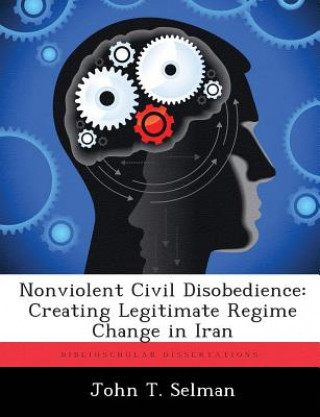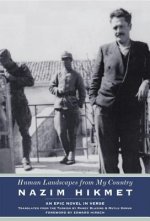
Kód: 08241531
Nonviolent Civil Disobedience
Autor John T Selman
War, diplomacy and economic sanctions are three cornerstones of strategy that have, in the past, successfully coerced rogue regimes to capitulate. However, it may be time to look beyond these persuasion techniques and develop a ne ... celý popis
- Jazyk:
 Angličtina
Angličtina - Vazba: Brožovaná
- Počet stran: 58
Nakladatelství: Biblioscholar, 2012
- Více informací o knize

Mohlo by se vám také líbit
-

The present state of the Church of Ireland: containing a description of it's precarious situation; and the consequent danger to the public. ... The se
495 Kč -

Essays, or Discourses, Selected from the Works of Feyjoo, and Translated from the Spanish, by John Brett, Esq. ... Volume 1 of 4
947 Kč -

Gay World. a Novel.
741 Kč -

Jacob Faithful ... Illustrated by H. M. Brock. with an Introduction by David Hannay.
875 Kč -

Good Morning! to You
644 Kč -

Final Trumpet
448 Kč -

Christ and the Hindu Diaspora
1024 Kč
Dárkový poukaz: Radost zaručena
- Darujte poukaz v libovolné hodnotě a my se postaráme o zbytek.
- Poukaz se vztahuje na celou naši nabídku.
- Elektronický poukaz vytisknete z e-mailu a můžete ihned darovat.
- Platnost poukazu je 12 měsíců od data vystavení.
Více informací o knize Nonviolent Civil Disobedience
Nákupem získáte 165 bodů
 Anotace knihy
Anotace knihy
War, diplomacy and economic sanctions are three cornerstones of strategy that have, in the past, successfully coerced rogue regimes to capitulate. However, it may be time to look beyond these persuasion techniques and develop a new method that can lead to regime change. During the 20th Century, there have been several nations that have successfully transitioned from authoritarian rule to democracy. The transitions were hastened by nonviolent civil disobedience. Although nonviolent civil disobedience is a common form of political action throughout the world, many political observers do not understand its nature and often underestimate its effect. Nonviolence is built on three key components that are found in most non-violent campaigns. By examining case studies it was possible to identify each component and its importance in a nonviolent civil disobedience campaign. The key components are mobilization, strategy, and ethics. South Africa's nonviolence campaign demonstrated the power individual groups possess when they come together as one against a regime. South Africa's minority population was successfully mobilized and the ANC used protests, strikes and boycotts to undermine the economy. When the economy collapsed, so did the regime that had profited from the corrupt handling of economic affairs. South African protesters were also able to draw worldwide support when they convinced other nations that apartheid was immoral. The successful overthrow of Ferdinand Marcos can be attributed to the same components of nonviolent civil disobedience. Like South Africa, several individual groups came together to protest the Marcos regime when Marcos declared martial law to avoid defeat in a democratic election. Philippine protestors used boycotts and strikes to tear apart the economy. When the military realized that Marcos no longer had control of the population, the Chief of Staff disavowed the regime. Once the military capitulated, Marcos'; power disintegrated. In each case
 Parametry knihy
Parametry knihy
Zařazení knihy Knihy v angličtině Society & social sciences Education
1646 Kč
- Plný název: Nonviolent Civil Disobedience
- Podnázev: Creating Legitimate Regime Change in Iran
- Autor: John T Selman
- Jazyk:
 Angličtina
Angličtina - Vazba: Brožovaná
- Počet stran: 58
- EAN: 9781288291175
- ISBN: 9781288291175
- ID: 08241531
- Nakladatelství: Biblioscholar
- Hmotnost: 122 g
- Rozměry: 246 × 189 × 3 mm
- Datum vydání: 13. November 2012
Oblíbené z jiného soudku
-

Speed and Accuracy: Multiplication
228 Kč -

Freiarbeitsmaterial für die Grundschule - Deutsch - Klasse 1/2
604 Kč -

Dancing Heads
368 Kč -

Oxford IB Diploma Programme: IB Economics Course Book
1594 Kč -

Business Partner B1+ Workbook
462 Kč -

Powerful Teaching: Unleash the Science of Learning
665 Kč -

Speed and Accuracy: Division
208 Kč -

Pearson Edexcel AS and A level Mathematics Statistics & Mechanics Year 1/AS Textbook + e-book
469 Kč -

Read Write Inc. Phonics: Red Ditty Book Bag Books (Mixed Pack of 10)
1587 Kč -

North Korea's Military Threat
698 Kč -

Release Your Inner Drive
403 Kč -

Cambridge IGCSE (R) & O Level Complete Physics: Student Book Fourth Edition
929 Kč -

Business Partner B1 Workbook
434 Kč -

Business Partner B2 Workbook
462 Kč -

Blue Book of Grammar and Punctuation: An Easy- to-Use Guide with Clear Rules, Real-World Examples , and Reproducible Quizzes, Twelfth Edition
393 Kč -

OET Preparation
246 Kč -

Embodied Teen
545 Kč -

KS3 Maths 10-Minute Weekly Workouts - Year 7
199 Kč -

Vertical Academy
919 Kč -

OET Reading Subtest Preparation
343 Kč -

Grade 9-1 GCSE Maths AQA Revision Question Cards - Higher
242 Kč -

Oxford IB Diploma Programme: IB Theory of Knowledge Course Book
1466 Kč -

Positive Discipline Tools for Teachers
433 Kč -

Oxford IB Diploma Programme: IB Course Preparation Mathematics Student Book
992 Kč -

1000 TRIOS or gapped sentences for Cambridge Advanced and Proficiency Exams
608 Kč -

(ISC) SSCP SG & SSCP Practice Test Kit, 3e
1745 Kč -

Czech Verbs
954 Kč -

Motivation and Reinforcement
1161 Kč -

Pearson Edexcel International GCSE (9-1) English Language B Student Book
1328 Kč -

GCSE Spanish Exam Practice Workbook (includes Answers & Free Online Audio)
220 Kč -

Imagine If...
306 Kč -

Oxford International Primary Maths Second Edition: Practice Book 1
323 Kč -

Vol 2 Blackletter Lettering Adventures
635 Kč -

AS & A Level Maths For Dummies
457 Kč -

Forensic Linguistics Articles
417 Kč -

CompTIA Security+ Review Guide - Exam SY0-601
621 Kč -

Abolition of Man
468 Kč -

Human Landscapes from My Country
656 Kč -

Corrected Squares of The Book of Abramelin
14513 Kč -

Hanbo Jutsu: Use of Hanbo, Cane and Walking Stick for Self Defense
284 Kč -

Reading Mind - A Cognitive Approach to Understanding How the Mind Reads
556 Kč -

KS3 Maths 10-Minute Weekly Workouts - Year 8
199 Kč -

Exam Prep for Microeconomics by Pindyck & Rubinfeld, 6th Ed.
1089 Kč -

English Language & Literature WORKBOOK: York Notes for GCSE (9-1)
237 Kč -

Effect of Registration Errors on Tracking in a Networked Radar System
1646 Kč -

Cambridge IGCSE (R) & O Level Complete Chemistry: Student Book Fourth Edition
992 Kč -

Princeton Review SAT Premium Prep, 2021
1134 Kč -

CEH v11 Certified Ethical Hacker Study Guide + Practice Tests Set
1872 Kč -

10 Practice Tests for the SAT, 2021 Edition
839 Kč
Osobní odběr Praha, Brno a 12903 dalších
Copyright ©2008-24 nejlevnejsi-knihy.cz Všechna práva vyhrazenaSoukromíCookies



 Vrácení do měsíce
Vrácení do měsíce 571 999 099 (8-15.30h)
571 999 099 (8-15.30h)